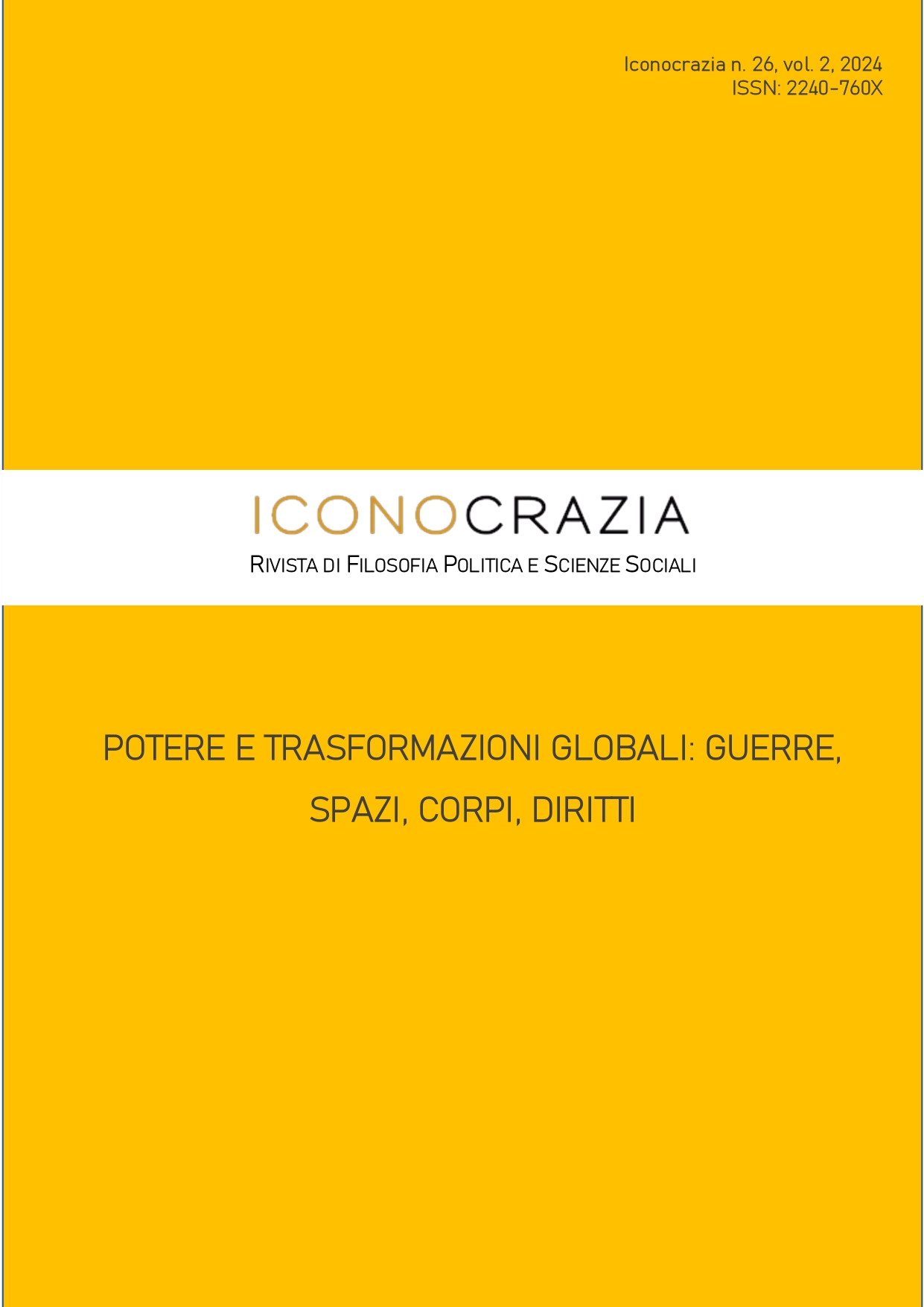Il reddito di base universale come strumento di welfare anti-oppressivo: un’analisi filosofico-politica
DOI:
https://doi.org/10.15162/2240-760X/2170Parole chiave:
Reddito di base universale, Stato sociale, approccio anti-oppressivo, disuguaglianze, filosofia politica, universal basic income, Welfare State, anti-oppressive approach, inequalities, political philosophyAbstract
Il saggio si propone di analizzare il ‘reddito di base universale’ quale potenziale strumento di welfare anti-oppressivo, esaminandone l’efficacia nel contrastare i meccanismi di controllo e le dinamiche vessatorie insite nei tradizionali modelli di welfare. Attraverso una rilettura critica delle prospettive filosofico-politiche di Philippe Van Parijs, Michel Foucault, Philip Pettit e André Gorz, lo studio mira a comprendere se tale misura possa intervenire efficacemente sulle oppressioni strutturali delle società contemporanee – che spesso si riproducono nei sistemi di protezione sociale – o se i suoi limiti intrinseci ne compromettano la portata emancipativa, rischiando di perpetuare quelle stesse disparità e forme di oppressione che intende superare. L’analisi pone in evidenza come il reddito di base, per realizzare pienamente il suo potenziale trasformativo, debba essere inserito in un disegno di policy più ampio, che includa iniziative di welfare ‘dal basso’ e investimenti nei servizi essenziali.
The paper aims to analyze the ‘universal basic income’ as a potential anti-oppressive welfare tool, assessing its effectiveness in countering the mechanisms of control and the coercive dynamics inherent in traditional welfare models. Through a critical re-examination of the philosophicalpolitical perspectives of Philippe Van Parijs, Michel Foucault, Philip Pettit, and André Gorz, the study seeks to determine whether this measure can effectively address the structural oppressions of contemporary societies – which are often reproduced within social protection systems – or whether its intrinsic limitations undermine its emancipatory potential, risking the perpetuation of the very disparities and forms of oppression it aims to overcome. The analysis highlights that for basic income to fully realize its transformative potential, it must be embedded within a broader policy framework that includes bottom-up welfare initiatives and investments in essential services.
Riferimenti bibliografici
Boltanski, L., & Chiapello, È. (1999). Le nouvel esprit du capitalisme. Paris: Gallimard
Büchs, M. (2021). Sustainable welfare: How do universal basic income and universal basic services compare?. Ecological Economics, 189, 107152
Butler, J. (2015). Notes toward a performative theory of assembly. Cambridge, MA: Harvard University Press
Coote, A. (2021). Universal basic services and sustainable consumption. Sustainability: Science, Practice and Policy, 17(1), 32-46
Coote, A., & Percy, S. (2020). The Case for Universal Basic Services. Cambridge: Polity Press
De Wispelaere, J., & Stirton, L. (2004). The many faces of universal basic income. The Political Quarterly, 75(3), 266–274
Dominelli, L. (2002). Anti-Oppressive Social Work Theory and Practice.
Hampshire: Palgrave Macmillan
Einaudi, L. (1949). Lezioni di politica sociale. Torino: Einaudi
Esping-Andersen, G. (1990). The three worlds of welfare capitalism. Princeton: Princeton University Press
Ferrera, M. (2013). Redditi più giusti: minimo e massimo, in Corriere della Sera, 24/11/2013, consultato il 21/01/2025
(https://lettura.corriere.it/debates/redditi-piu-giusti-minimo-emassimo/#. UpG0Yy70XY0.twitter)
Foucault, M. (1975). Surveiller et punir. Naissance de la prison. Paris: Gallimard
Id. (2004). Naissance de la biopolitique. Paris: Gallimard
Fraser, N. (2013). Fortunes of Feminism. From State-Managed Capitalism to Neoliberal Crisis. London-New York: Verso
Fraser, N., & Honneth, A. (2007). Redistribuzione o riconoscimento? Una controversia politico-filosofica. Roma: Meltemi
Frey, C. B., & Osborne, M. A. (2017). The future of employment: How susceptible are jobs to computerisation?. Technological forecasting and social change, 114, 254-280
Gorz, A. (1992). Metamorfosi del lavoro. Critica della ragione economica. Torino: Bollati Boringhieri
Id. (1998). Miserie del presente, ricchezza del possibile. Roma: Manifestolibri
Id. (2009). Ecologica. Milano: Jaca Book
Id. (2020). Addio al lavoro. Roma: Castelvecchi
Granaglia, E. (2022). Uguaglianza di opportunità. Sì, ma quale?. Bari-Roma: Laterza
Harvey, D. (2005). A brief history of neoliberalism. Oxford: Oxford University Press
Hayek, F. A. (1995). La via della schiavitù. Milano: Rusconi
Hemerijck, A. (2017). The uses of social investment. Oxford: Oxford University Press
Lødemel, I., & Trickey, H. (2001). An offer you can’t refuse: Workfare in
international perspective. Bristol: Policy Press
Lovett, F. (2010). A general theory of domination and justice. Oxford: Oxford University Press
Marshall, T. H. (1976). Cittadinanza e classe sociale. Torino: UTET
Marx, K. (1989). Il Capitale. Roma: Editori Riuniti
Murray, C. (2006). In our hands: A plan to replace the welfare state. Washington DC: AEI Press
Nozick, R. (1974). Anarchy, state, and utopia. New York: Basic Books
Offe, C. (1984). Contradictions of the Welfare State. London: Hutchinson
Pateman, C. (1988). The sexual contract. Stanford, CA: Stanford University Press
Peck, J. (2001). Workfare states. New York, NY: Guilford Press
Peck, J. & Theodore, N. (2000). Work first: workfare and the regulation of contingent labour markets, Cambridge Journal of Economics, 24(1), 119-138
Paine, T. (1797). Agrarian Justice, in M. Foot e I. Kramnick (a cura di), The Thomas Paine. Reader, Harmondworth: Penguin
Pettit, P. (1997). Republicanism: A Theory of Freedom and Government. Oxford: Oxford University Press
Id. (2007). A republican right to basic income?, Basic Income Studies, 2(2), 1-8
Piketty, T. (2014). Il capitale nel XXI secolo. Milano: Bompiani
Piven, F. F., & Cloward, R. A. (1993). Regulating the poor: The functions of public welfare. New York: Vintage Books
Rawls, J. (1971). A theory of justice. Cambridge: Harvard University Press
Rose, N., & Miller, P. (1992). Political power beyond the state: Problematics of government, British Journal of Sociology, 43(2), 172-205
Russell, B. (1918). Roads to Freedom: Socialism, Anarchism, and Syndicalism. London: Allen and Unwin
Sen, A. (1999). Development as freedom. New York: Alfred Knopf
Standing, G. (2011). The precariat: The new dangerous class. London: Bloomsbury
Id. (2017). Basic Income: And How We Can Make It Happen. London: Penguin
van Parijs, P. (1995). Real Freedom for All: What (if Anything) Can Justify Capitalism?. Oxford: Oxford University Press
Id. (2020). Basic income: Finland’s final verdict, in Social Europe, 07/05/2020, consultato il 21/01/2025 (https://www.socialeurope.eu/basicincome-positiveresults-
from-finland)
van Parijs, P., & Vanderborght, Y. (2017). Il reddito di base. Una proposta radicale. Bologna: Il Mulino
Wacquant, L. (2009). Punishing the poor: The neoliberal government of social insecurity. Durham NC: Duke University Press
Weeks, K. (2011). The problem with work: Feminism, Marxism, antiwork politics, and postwork imaginaries. Durham NC: Duke University Press







